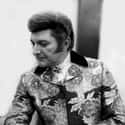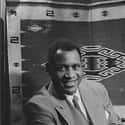-
(#12) Liberace
- Band/Musician
Wladziu Valentino Liberace, better known as the the performer and musician "Liberace," generated a 400-page FBI file that documented the closeted celebrity's homosexuality and gambling habits. Much of this attention was generated by a robbery of $25,000 worth of Liberace's jewelry from a Dallas hotel in 1974, which the FBI eventually solved. Although Hoover and the FBI did nothing overtly hostile to Liberace, he was an example of a celebrity whose unusual lifestyle was investigated and chronicled at Hoover's specific request.
-
(#11) Paul Robeson
Paul Robeson was a remarkable attorney, artist, athlete, and singer who also was an outspoken proponent of civil rights and an unabashed supporter of the Soviet Union in the '40s and '50s. To stop Robeson from traveling abroad and to limit his ability to earn a living as a singer and performer, in 1950, the US Government refused to renew his passport after he declined to swear to a loyalty oath that disavowed membership in the Communist Party and promised loyalty to the United States. He filed a lawsuit against the US Government, which eventually resulted in the restoration of his passport. By then, his notoriety rendered him unemployable, and his mental health began to deteriorate. In March of 1961, he allegedly attempted suicide in Moscow, an incident that his son would describe in terms of FBI intimidation:
"From the files I received, it was obvious that there were agents who did nothing but follow every public event of my father, or even of me... It took on a life of its own... Over time, even for someone as powerful and with as many resources as my dad had... the attrition got to him."
Robeson eventually returned to the United States but never disavowed his criticism of an American society he believed to be racist and oppressive. He died in Philadelphia in 1976. His FBI file totaled close to 2,700 pages.
-
(#4) Grateful Dead
- Band/Musician
Hoover and the FBI were convinced that rock and roll bands were somehow directly responsible for the proliferation of drug use in the '60s. One band that was supposedly knee deep in distributing LSD along the West Coast was the Grateful Dead, but the Bureau's files seem so out of touch as to render the suspicion ludicrous. The Dead are described in a 1970 official report as “a rock group of some sort.” Files also indicate that the band was one of several San Francisco-based acts that were an "internal security" threat from "the New Left."
FBI agents would routinely appear at Dead shows and were quite serious about the Dead's responsibility for massive amounts of LSD distribution. The final entry in their publicly available file is “LSD originates from San Francisco, California through a renowned rock group known as Grateful Dead. The Grateful Dead is well known to DEA, San Francisco.”
-
(#7) Charlie Chaplin
- Actor
British-born Charlie Chaplin was another personal obsession of J. Edgar Hoover, especially because Chaplin's leftist leanings and non-citizenship made him an easy target during the early '50s. Hoover distributed damaging rumors and malicious innuendo about Chaplin to one of his go-to gossip columnists, Hedda Hopper. She faithfully chronicled alleged communist ties and dissolute behavior on the part of the Hollywood icon.
Chaplin became so unpopular that he decided to stage the 1952 premiere of his film Limelight in London, his American bookings having become nonexistent. Upon his exit from the US, Chaplin was informed that his permission to reenter the country had been revoked by the Attorney General. Chaplin was so alarmed and disillusioned by this – as well as subsequent political developments during the '50s – that he remained in Europe and only briefly returned to Los Angeles to receive an honorary Academy Award in 1972, a mere days before Hoover's death.
-
(#5) Jean Seberg
The treatment of American actress Jean Seberg by J. Edgar Hoover and the FBI was so egregious that it prompted a monumental Federal Senate investigation of the Bureau's operations and techniques. That's because, in the wake of the FBI aggressively harassing her on an international scale and fabricating slanderous lies about her pregnancy, Seberg committed suicide. Seberg appeared in several high-profile American films of the '50s and '60s, including The Mouse That Roared, Paint Your Wagon, and Airport. During the '60s, she contributed money to various activist groups, including the NAACP and Native-American organizations.
Hoover was reportedly particularly offended by the funding Seberg provided to the Black Panther Party. In 1970, the FBI helped concoct and plant a story in the mainstream media that Seberg's pregnancy was the result of a relationship with a Black Panther and not her husband. Upset, Seberg gave birth prematurely, and the infant subsequently died only days later. An open casket funeral of a Caucasian child refuted the FBI's subterfuge, and Seberg successfully sued Newsweek for printing the allegation. It is believed that Seberg was effectively blacklisted in Hollywood at this time, and she relocated to France where she continued her career in some memorable performances.
Still, she would be subjected to aggressive personal surveillance, burglaries, and phone wiretaps in France, Italy, and Switzerland. Her conduct and activities were routinely reviewed by both President Nixon and the Attorney General. Seberg officially committed suicide under mysterious circumstances in August of 1979, her loved ones alleging that her mental health had deteriorated under the stigma and systematic abuse of the clandestine campaign of the US Government. With Hoover already dead, the Bureau acknowledged misbehavior and instituted reforms prompted by the US Senate investigation known as the "Church Committee."
-
(#10) Leonard Bernstein
Famed composer and conductor Leonard Bernstein came to the attention of the FBI in the early '40s for his supposed support of groups potentially harboring communist sympathies. Such information concerning Bernstein's interactions with or sponsorship of fundraising events connected to officially subversive organizations had disastrous personal consequences for Bernstein.
As a result of them, he was denied the renewal of his passport in 1953 at the height of the blacklisting and the House Un-American Activities Committee's furor over American communist infiltration. Bernstein's passport denial – undoubtedly prompted by the FBI's lengthy investigation into his background – forced him to undergo a humiliating process in which he was forced to disavow his previous connections, swear allegiance to the US, and deny any official Communist Party membership.
Following the hysteria of the '50s, Bernstein drew the FBI's attention again in 1970 when he famously sponsored a fundraiser for the Black Panther Party at his Park Avenue apartment. Although this high-profile event would prompt popular-culture mockery by Tom Wolfe, among others, for its "radical chic" behavior, it also set off an FBI attempt to discredit Bernstein by leaking word of his connections to a Black Panther murder suspect. Information from Bernstein's lengthy FBI file was only obtained after an ACLU lawsuit. Heavily redacted, it contains nothing of Bernstein's bisexual affairs, something the FBI would have undoubtedly unearthed. This precipitated additional lawsuits to force the FBI to release un-redacted and complete versions of Bernstein's FBI files.
New Random Displays Display All By Ranking
About This Tool
Under the leadership of J. Edgar Hoover, the FBI became the most powerful institution in the American judicial system. Under the special circumstances of the United States, John Edgar Hoover served as FBI Director for 48 years and 8 US presidents changed during his tenure. His influence and power even surpassed the president. He was both mysterious and terrifying and tried to destroy some celebrities who had no criminal background.
Hoover realized the importance of public opinion, and he began to interact well with the media, which laid a solid foundation for his propaganda and political struggle against crime in the future. As the head of America's largest intelligence agency, J. Edgar Hoover knew too many secrets. The random tool lists 12 famous historical figures that J. Edgar Hoover hated and tried to destroy.
Our data comes from Ranker, If you want to participate in the ranking of items displayed on this page, please click here.
















